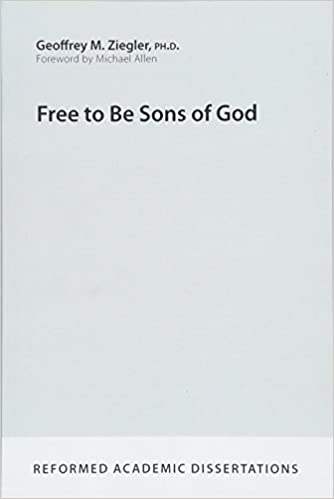A Brief Book Summary from Books At a Glance
by Steve West
About the Author
Geoffrey M. Zieglar is senior pastor of Trinity Presbyterian Church (PCA) in Hinsdale, Illinois.
Introduction
Free to Be Sons of God is part of P&R’s Reformed Academic Dissertations series. In this book, Ziegler examines the concept of freedom philosophically, theologically, and biblically. He finds that the Bible presents freedom as being inseparably tied to God in the bonds of sonship. Christ is God’s true Son, and believers are united with Christ and receive the blessings of adopted sonship in him. Far from being found in radical human autonomy, freedom is found in submission to God as a restored member of his family.
Table of Contents
Chapter 1 Introduction
Chapter 2 Freedom in Mill’s Naturalistic Liberalism
Chapter 3 Freedom and Sonship in the Old Testament
Chapter 4 Freedom and Sonship in the Pauline Epistles
Chapter 5 Freedom and Sonship in the Johannine Writings
Chapter 6 John Calvin, Adoption, and Freedom
Chapter 7 Conclusion
Book Summary
Chapter 1: Introduction
In our culture, freedom is often understood as radical autonomy. In the Bible, however, absolute human autonomy is not freedom: it is perverse; it is antithetical to freedom. Defining “freedom” is notoriously difficult, but there are three elements we need to keep in mind: 1. We will focus on the valuational aspect of freedom (i.e. it is intrinsically good); 2. It is the opposite of slavery and is required for flourishing, and; 3. It promotes individual and societal well-being. Identifying such freedom with human autonomy is a departure from a great deal of Western historical thought. In the early church, our freedom was sometimes tied to the fact that we bore the image of God. Sin was seen as a loss of freedom, not a gain. Through the incarnation and work of Christ, the Fathers saw a saving restoration to freedom. Knowing and loving God, adopted into his family—such are the marks of restored freedom. Freedom was identified with adoption, and this led to an intensification of the need for obedience.
Augustine rejected libertarian free will and argued that we are free when we will in accord with our desires (rather than on the basis of external compulsion). In our sin nature, our desires are directed improperly: we are enslaved to evil. We need God to reorient our desires. One of the traits of modernity was the rejection of the view that freedom was found in submission to God. Rather, freedom was found in being true to one’s own self. Some in the church accepted this idea and proposed that God must address people in their freedom. Others have taken a far more Augustinian position, while still others plot out on various parts of the spectrum. Many Christian theologians are maintaining that libertarian freedom is necessary for goodness, love, and for constructing an adequate theodicy. Those in the Reformed tradition take the opposite position. This book will examine the concept of true freedom as being bound in relationship to God through adoption, rather than freedom as human autonomy. . . .
[To continue reading this summary, please see below....]The remainder of this article is premium content. Become a member to continue reading.
Already have an account? Sign In
Buy the books

FREE TO BE SONS OF GOD, by Geoffrey M. Ziegler